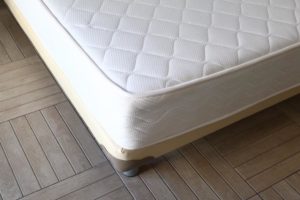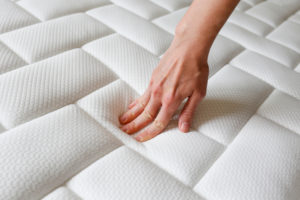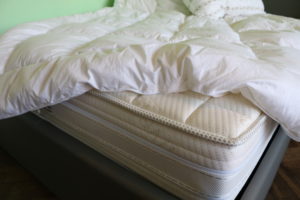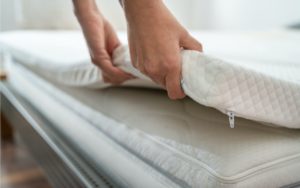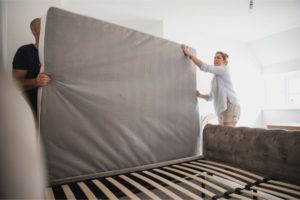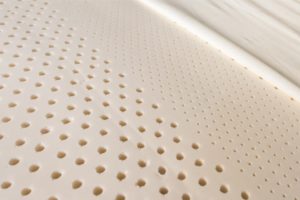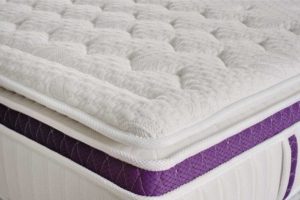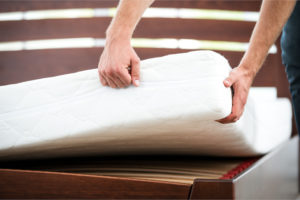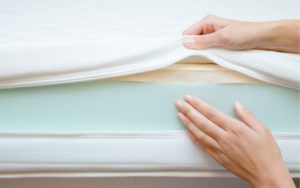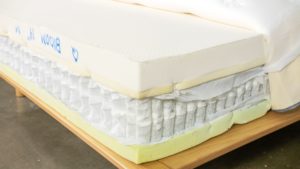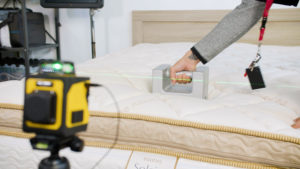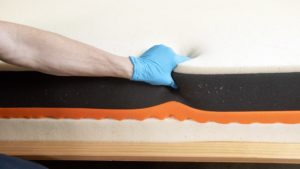Should Mattresses Be Placed Directly on the Floor?
When you buy a new mattress, you will have to make the decision of whether to use a box spring, a foundation, a slatted bed frame, or to simply place your mattress on the floor. There are pros and cons to each approach, and the best option will depend on the type of mattress you have.
Many people prefer the simplicity of placing their mattress on the floor. This is the most affordable route – but it’s not always a good idea. Most mattresses can be put directly on the floor, but whether or not they should be is another question entirely.
Most mattresses can be placed on the floor. However, there are some significant downsides to this approach:
Let us help you find the perfect bed
Answer a few questions to find the right mattress for your unique needs
- It may void your warranty – be sure to check the manufacturer’s instructions and warranty terms
- It may result in mildew or mold, particularly in warm or humid environments
- It restricts airflow around the mattress, which can cause it to feel uncomfortably warm
- It makes it easier for insects, including bed bugs, to gain access to the mattress
- It can lead to an increase in dust and dust mite accumulation in the mattress
- It may make it more awkward to get in and out of bed
With that said, there are some benefits as well. The most significant is that you can save money. A typical bed frame or foundation might cost you $150-$300 or more. Placing your mattress directly on the floor eliminates this cost.
There are also aesthetic reasons to place a mattress on the floor. It can help make a room feel larger, an effect that will be particularly noticeable in rooms with low ceilings. It also has a minimalist feel, which works well with certain design aesthetics. If you prefer the low-profile look, you may also wish to consider a platform bed.
Finally, the floor can support your mattress well. A floor will provide firm, even support to your mattress, allowing it to properly support your body. In most situations, placing a mattress directly on the floor will not significantly impact its comfort, support, or overall feel. Keep in mind that some mattresses require certain types of support, which the floor may or may not provide. Learn whether or not you need a box spring in our guide, or consult the manufacturer’s instructions.
Tips for Using a Mattress on the Floor
If you do decide to place your mattress directly on the floor, there are some points to consider and best practices that you should follow:
Cleanliness
Because your mattress will be directly resting on the floor, it’s very important to keep things clean. You should routinely dust/sweep/vacuum the floor, and sanitize it using cleaning products at least once a month. After cleaning, be sure to allow the floor to dry completely before replacing the mattress. Be sure to clean your mattress regularly, as well.
Moisture
Keeping a mattress on the floor can result in unwanted moisture issues, which can lead to mold and mildew. To counter this, it’s wise to periodically prop your mattress up against the wall to allow it to air out. Whenever you move your bed, be sure to check for signs of moisture, excessive dust, and bugs.
Mobility
Getting in and out of a bed that’s placed directly on the floor can be challenging for some. Those with mobility issues will generally find it easier to use a mattress on a traditional bed foundation.
Insulation
Particularly if your floor is hardwood or tile, it’s wise to place a thin layer of foam or cardboard between the mattress and the floor. This will help insulate the mattress, keeping the temperature more comfortable on cold nights. This method has the added benefit of keeping your mattress from directly touching the floor, without having to commit to a bed frame or foundation.
Warranty
Many mattress warranties dictate the type of bed frame or foundation that is required for the mattress. In many cases, using an improper foundation can void the warranty of your mattress. Placing your mattress on the floor may prevent you from making a warranty claim, in the case that your mattress becomes damaged. Be sure to check the warranty terms closely, and reference the manufacturer’s instructions to see which type of foundation you’ll need.

Still have questions? Ask our community!
Join our Sleep Care Community — a trusted hub of sleep health professionals, product specialists, and people just like you. Whether you need expert sleep advice for your insomnia or you’re searching for the perfect mattress, we’ve got you covered. Get personalized guidance from the experts who know sleep best.










